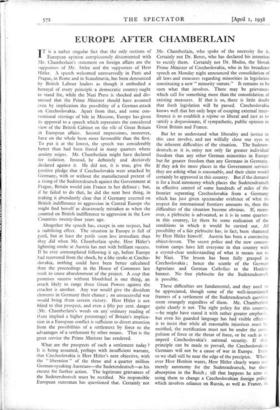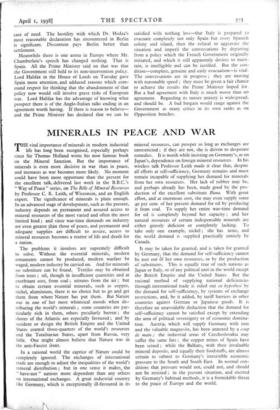EUROPE AFTER CHAMBERLAIN
IT is a rather singular fact that the only sections of European opinion conspicuously discontented with Mr. Chamberlain's statement on foreign affairs are the supporters of Mr. Attlee and the supporters of Herr Hitler. A speech welcomed unreservedly in Paris and Prague, in Rome and in Scandinavia, has been denounced by British Labour leaders as though it embodied a betrayal of every principle a democratic country ought to stand for, while the Nazi Press is shocked and dis- tressed that the Prime Minister should have assumed even by implication the possibility of a German attack on Czechoslovakia. Apart from that, and some con- ventional stirrings of bile in Moscow, Europe has given its approval to a speech which represents the considered view of the British Cabinet on the role of Great Britain in European affairs. Second impressions, moreover, have on the whole been more favourable than the first. To put it at the lowest, the speech was considerably better than had been feared in many quarters where anxiety reigns. Mr. Chamberlain might have declared for isolation. Instead, he definitely and decisively declared against it. He did not, it is true, give the positive pledge that if Czechoslovakia were attacked by Germany, with or without the manufactured pretext of a rising of the Sudetendeutsch against the Government at Prague, Britain would join France in her defence ; but, if he failed to do that, he did the next best thing, in making it abundantly clear that if Germany counted on British indifference to aggression in Central Europe she might find herself as disastrously mistaken as when she counted on British indifference to aggression in the Low Countries twenty-four years ago.
Altogether the speech has, except in one respect, had a stabilising effect. The situation in Europe is full of peril, but at least the perils seem less immediate than they did when Mr. Chamberlain spoke. Herr Hitler's lightning stroke at Austria has met with brilliant success. If he ever contemplated following it up, before Europe had recovered from the shock, by a like stroke at Czecho- slovakia, nothing could have been better calculated than the proceedings in the House of Commons last week to cause abandonment of the project. A coup that promises success without bloodshed is one thing, an attack likely to range three Great Powers against the attacker is another. Any war would give the dissident elements in Germany their chance ; an unsuccessful war would bring them certain victory. Herr Hitler is not blind to that prospect, and even a fifty per cent. danger (Mr. Chamberlain's words on any ordinary reading of them implied a higher percentage) of Britain's implica- tion in a European conflict is sufficient to divert attention from the possibilities of a settlement by force to the advantages of a settlement by other means. That is the great service the Prime Minister has rendered.
What are the prospects of such a settlement today ? It is being assumed, perhaps with insufficient warrant, that Czechoslovakia is Herr Hitler's next objective, with the " liberation " of the three and a quarter million German-speaking Austrians—the Sudetendeutsch—as his excuse for further action. The legitimate grievances of the Sudetendeutsch must be rectified. No responsible European statesman has questioned that. Certainly not Mr. Chamberlain, who spoke of the necessity for it. Certainly not Dr. Benes, who has declared his intention to rectify them. Certainly not Dr. Hodza, the Slovak Prime Minister of Czechoslovakia, who in his broadcast speech on Monday night announced the consolidation of all laws and measures regarding minorities in legislation constituting a new " minority statute." It remains to be seen what that involves. There may be grievances which call for something more than the consolidation of existing measures. If that is so, there is little doubt that fresh legislation will be passed. Czechoslovakia knows well that her only hope of escaping external inter- ference is to establish a regime so liberal and just as to satisfy a dispassionate, if sympathetic, public opinion in Great Britain and France.
But let us understand what liberality and justice in this case involve, and not wilfully close our eyes to the inherent difficulties of the situation. The Sudeten- deutsch, as it is, enjoy not only far greater individual freedom than any other German minorities in Europe but far greater freedom than any Germans in Germany. If they ask for more places in the Government services they are asking what is reasonable, and their claim would certainly be approved in this country. But if the demand is for a local autonomy which places the Sudetendeutsch in effective control of some hundreds of miles of the frontier separating Czechoslovakia from a Germany which has just given spectacular evidence of what its respect for international frontiers amounts to, then the difficulties of the situation become obvious. If, more- over, a plebiscite is advocated, as it is in some quarters in this country, let there be some realisation of the conditions in which it would be carried out. All possibility of a fair plebiscite has, in fact, been shattered by Herr Hitler himself. Austria has been a convincing object-lesson. The secret police and the new concen- tration camps have left everyone in that country with a crystal-clear understanding of what it means not to be Nazi. The lesson has been fully grasped in Czechoslovakia ; hence the scuttle of the German Agrarians and German Catholics to the Henlein banner. No free plebiscite for the Sudetendeutsch is possible.
These difficulties are fundamental, and they need to be appreciated, though some of the well-intentioned framers of a settlement of the Sudetendeutsch question seem strangely regardless of them. Mr. Chamberlain quite clearly is not. The right policy for this country, —he might have stated it with rather greater emphasis, but even his guarded language has had visible effect— is to insist that while all reasonable injustices must be rectified, the rectification must not be under the com- pulsion of force or the threat of force, or be such as to imperil Czechoslovakia's national security. If that principle can be made to prevail, the Czechoslovakian Germans will not be a cause of war in Europe. Eve:a so we shall still be near the edge of the precipice. What- ever Herr Henlein wants, Herr Hitler clearly wants not merely autonomy for the Stidetendeutsch, but their absorption in the Reich ; till that happens he aims at using them to change a Czechoslovakian foreign policy which involves reliance on Russia, as well as France, in case of need. The hostility with which Dr. Hodza's most reasonable declaration has encountered in Berlin is significant. Discontent pays Berlin better than settlement.
Meanwhile there is one arena in Europe where Mr. Chamberlain's speech has changed nothing. That is Spain. All the Prime Minister said on that was that the Government still held to its non-intervention policy. Lord Halifax in the House of Lords on Tuesday gave Spain more attention, and adduced reasons which com- mand respect for thinking that the abandonment of that policy now would still involve grave risks of European war. Lord Halifax has the advantage of knowing what prospect there is of the Anglo-Italian talks ending in an agreement worth having. If there is reason to believe— and the Prime Minister has declared that we can be satisfied with nothing less—that Italy is prepared to evacuate completely not only Spain but every Spanish colony and island, then the refusal to aggravate the situation and imperil the conversations by departing from a policy which the French Government originally initiated, and which it still apparently desires to main- tain, is intelligible and can be justified. But the con- dition—complete, genuine and early evacuation—is vital. The conversations are in progress ; they are moving with reasonable speed ; they must be given a fair chance to achieve the results the Prime Minister hoped for. But a bad agreement with Italy is much worse than no agreement. Regarding its nature anxiety is widespread, and should be. A bad bargain would range against the Government as many critics in its own ranks as on Opposition benches.















































 Previous page
Previous page